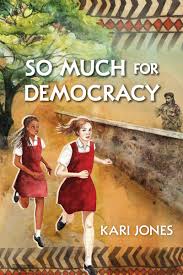
So Much for Democracy
Written by Kari Jones
Orca Books, 2014, 170 pp.
ISBN-13: 978-1459804814
“What do you mean, unrest?” She shakes her head. “I’m not sure what I mean. These are uncertain times for Ghana. Let’s hope I am mistaken and the elections go on as planned.” (p. 81)
This novel is told through the eyes of Canadian 12-year-old Astrid, who is in Ghana with her family as her father helps with the 1979 elections. So Much for Democracy presents the actual historical situation in Ghana when a group of military personnel attempted a coup. From Astrid’s perspective, readers see the multiple responses of ex-patriots who were in the country during the occurrence as well as its outcome. At the beginning of the novel, Astrid is living what she considers a typical life–she goes to school, is irritated by her younger brother and his friends, and takes care of her younger sister. As tensions heat up, Astrid finds the reactions of her mother and other adults mystifying and unnerving. Her father attempts to keep everyone calm, but it is Astrid who becomes the glue that keeps the family together. The narrative shows how quickly political situations can develop and what can occur when they do.
This middle grade novel will have readers questioning not only the reasons for political unrest, but the ways in which people respond to such situations. Astrid is a well-rounded character who changes as she becomes more knowledgeable about the events taking place around her. Young readers will be able to think about the place of family in stressful situations, what events take place around the world where safety cannot be readily assumed, and how relationships can change as situations shift the political landscape. This novel, ultimately about learning how life can change at any moment but family is a strong foundation, gives readers the opportunity to develop a more comprehensive understanding of the connection between governments and residents, both historic and current, and those who live in fear because of governmental or political circumstances. This narrative could be used in a unit about political situations and family relationships that would include Ask Me No Questions (Marina Budhos, 2006), Kezzie (Theresa Breslin, 2002), A Step from Heaven (An Na, 2003), and Far from the Bamboo Tree (Yoko Kawashima Watkins, 2008). So Much for Democracy has the potential for inspiring students to understand more about the country of Ghana, the continent of Africa, and the histories connected to that nation and region of the world.
Kari Jones has traveled throughout her life, and spent a number of years in Ghana as a young teen. She currently lives in British Columbia, Canada. More information about her can be found at her website.
Holly Johnson, University of Cincinnati
WOW Review, Volume VII, Issue 1 by Worlds of Words is licensed under a Creative Commons Attribution-NonCommercial-ShareAlike 4.0 International License. Based on work at https://wowlit.org/on-line-publications/review/vii-1/
